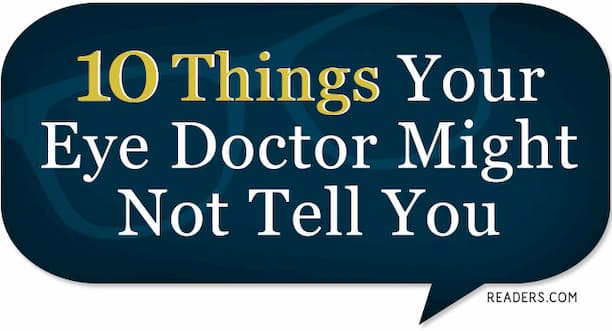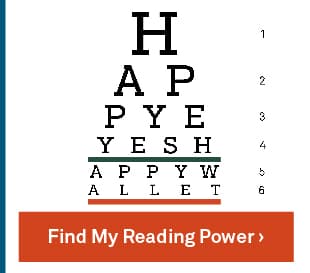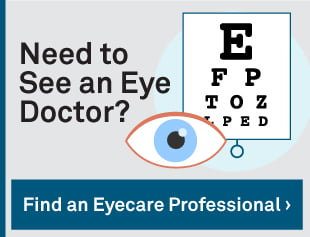Would you know if your doctor was overcharging you or leaving out important information? Learn the most common eye doctor myths below, and prepare yourself with a list of questions before your next visit. It never hurts to ask!
Psst … Looking for more? Test your smarts with these vision and glasses myths, too!

Truth #1: Ophthalmologists and optometrists are not the same thing.
Optometrists, who have a doctor of optometry degree, check you for routine eye health and prescriptions, while ophthalmologists, who have their MD, are additionally able to perform invasive surgeries and procedures. Over the years, the lines between these two eye professionals has blurred, as all 50 states widened regulations to allow optometrists to treat many of the same medical conditions that ophthalmologists previously treated.
Rule of thumb: For regular checkups, as well as problems affecting the surface of the eye (such as allergies, irritations, eyestrain, and conjunctivitis), an optometrist is sufficient. If you’re experiencing serious symptoms such as loss of vision or seeking eye surgery, you should consider visiting an ophthalmologist.
Truth #2: Some routine eye tests are not always necessary.
A few tests during a routine checkup are normal: the eye chart that gives a basic idea of what you can see (you can also use this handy diopter chart); a refraction test that requires you to look through a machine to determine your exact prescription; and a cover test that reveals how your eye muscles work together. But some “routine” tests for otherwise healthy patients are probably unnecessary. A visual field examination, in which a machine is used to check peripheral vision, may not always be necessary, and eye dilation and macular pigment testing might not have to be tested every visit (unless you have a history of risk). If you are paying over $100 per checkup, you’re probably paying too much.
Truth #3: Online is a great place to buy glasses.
The internet is an easy and often less expensive place to buy glasses. Online, you can find cheaper versions of designer glasses, as well as normal reading glasses. Some retail prices at the store or a private practice are often marked up over 50 times the manufacturing price. Because most eye doctors want you to buy glasses from them, make sure to check out the selection online first. Your wallet (and your eyes) will thank you! For more info on buying glasses online, at the pharmacy, or with your eye doctor, check out our guide to buying reading glasses, or visit our store. You can find everything from computer glasses to reading sunglasses without leaving your couch. How easy is that?
Truth #4: Doctors are required by law to give you your contact lens prescription.
Eye doctors are required by law to give you your eyeglasses prescription after the exam, enabling you to buy glasses wherever you want. It wasn’t until the early 2000s that they had to do the same with contact lenses. Under this law, a doctor can no longer make you buy your lenses from his or her office once the in-office exam is complete.
Truth #5: Kids should visit a special eye doctor.
For the first five years of their lives, children’s eyes develop rapidly. Pediatric ophthalmologists and optometrists are specially trained to identify and treat vision problems in kids. Find a pediatric ophthalmologist or optometrist close to you. If your child shows signs of needing glasses, avoid mass retailers and use a shop that specializes in kids’ glasses, since fitting their prescription and frames can get tricky.
Truth #6: Extras for glasses, such as scratch coatings, might not be necessary.
Extra coatings such as anti-glare or scratch-resistant coatings are not always necessary. Some eye doctors will suggest these extras simply to make more money. In many cases, qualities such as “scratch-resistant” are already a characteristic of the lens material. For example, polycarbonate lenses are naturally scratch-resistant, and polarized lenses naturally fight glare. There are many more instances in which extra coatings may not be necessary, so our best advice is to ask questions and research the different types of lenses.
Truth #7: Lasers used for LASIK eye surgery are not created equal.
Laser surgery — the most common refractive surgery that alters the eye to correct vision — continues to grow in popularity. However, even with the best equipment, surgeons must be consistent in getting their lasers updated regularly to help guarantee a safe performance. When shopping for a laser surgeon, ask doctors how often they perform treatments. A good resource to research laser options is the Food and Drug Administration (FDA) informational site (FDA.gov).
Truth #8: Laser surgery does not last forever.
While LASIK surgery puts your odds for perfectly clear vision at about 94 to 98 percent, up to 10 percent of patients need a follow-up procedure. Unfortunately even with the procedure, perfect vision does not last forever, and as the eyes age, you may still need reading glasses. Also, make sure to note that LASIK is categorized by many insurance companies as a cosmetic procedure and might not be covered on your plan.
Truth #9: Not all glaucoma eye drops are safe.
Glaucoma, a disease caused by a damaged optic nerve, can lead to irreversible loss of vision. Doctors sometimes prescribe pressure-lowering eye drops to glaucoma patients, but be careful; some can cause a laundry list of side effects and are often dangerous. It is best to research or talk to a doctor you can trust about eye drops and their side effects.
Truth #10: If you need your glasses adjusted, you can learn to do it yourself.
Professionals use a variety of tools to adjust glasses, from heat to pliers to screwdrivers. Often, brick-and-mortar stores are willing to adjust your glasses for you even if you did not buy the glasses there, but if you decide to adjust glasses yourself, there are some easy ways to fine-tune your fit. Just be sure to be extremely careful while doing it — the adjustable parts of glasses are small, thin, and easily damaged if twisted the wrong way. Just remember, while about 70% of glasses adjustments you can do on your own, you will need a professional’s help for some more advanced adjustments. That being said, there are many how-to websites that provide step-by-step tutorials on simple ways to perform the easier adjustments.
As with any medical condition or procedure, please consult your eye doctor, optometrist, or ophthalmologist before making decisions about your health. This resource is purely educational and meant to better prepare you to ask questions during your visit. For more information on our disclaimer, click here.





8 Comments
Krinj
“Over the years, the lines between these two eye professionals has blurred…”
“blurred” – ‘see’ what you did there?
Jj McD
Not sure who is sponsoring this misleading post, but buying glasses online is not a great option for most people. The quality of online eyewear ranges from not great to awful. The measurements aren’t accurate and the quality of frames and lenses are definitely low. There is a reason that in many states people who sell you glasses are licensed, because it is a skilled profession. Eyeglasses are a custom product, with decades of technology put into every custom pair you are fitted with at a real optometrist/ophthalmologist.
Susan Honig
Right. Optometrists use a type of gauge to measure your size and fit it to the choice of eye glasses you chose. It is very precise. It is worth having them do this if it make the glasses more accurate and comfortable for you. Plus, it is better to put different frames on in the store, so you know what looks good on your face, believe me, you’ll know which ones do not work for you.
Marina
I have several pairs of glasses from my doctor and several from online. I only like one pair from my doctor and I am IN LOVE with two pairs I got online. I put my prescription in and I kept track of all the measurements of the glasses I got online. I returned two pairs I didn’t like. I learned that the height of the lens was not right for me and made a note of it. Now I know which ones I would like by reading the exact measurements of the glasses. I love being able to buy multiple pairs of glasses for the price of one at the doctor.
Amy Larson
This was the worst, most misleading article I’ve read in awhile. Plastic, scratched up, (and they will get scratched up with out the coating) cheap online lenses are nice and cheap, and cheapen the view of the world around you as well. It’s better than nothing for those that don’t have any money. But honestly- isn’t vision one of the most important things in our lives? Would you rather view the world through an old box TV set, or a flat screen HDTV? That is the difference you’ll see by the glasses you invest in. Most likely you’ll feel a world of a difference if you have an optician adjust your glasses for you too!
Getting Tired
What a load of rubbish disguised as bullshit! Obviously written by a shill for online glasses sellers, probably an ophthalmologist. Of course, ophthalmologists and optometrists are not the same; the former uses technicians to do the exams, the latter does the exam himself. Most eye MDs would rather just deal with surgical cases and let good optometrists near them handle all the rest. The days of optometrists being glorified lens grinders ended long ago.
Sure, you can save $10 and not get your lenses scratch-coated. In three months they will be useless, and, since uncoated lenses NEVER have warranties on them, you will spend more money on a new pair of lenses. If optometrists wanted to gouge patients on glasses sales, they would recommend uncoated lenses. I’ve never seen one who did.
As for buying glasses online, the stupidity of the public never seems to amaze me. If it’s online, it must be better! Try getting some service if/when something goes wrong. Most people would never buy a custom-fitted suit or dress online, but will buy custom-made durable medical equipment online. Stupid! Lastly, when you finish playing optician because you broke your glasses, don’t expect the shop you visit to fix it for free. No auto mechanic would do that if you tried to change your oil and cross-threaded the oil filter.
Hobbes K
So many fear mongering optometrists/opticians in the comment section…
I’ve ordered several of my glasses online, saved thousands of dollars, and received the correct prescription glasses. How do I know the prescriptions are correct?
My dad is an ophthalmologist (read M.D.) and not only does he have equipment to check my glasses for accuracy, he gives me a second eye exam to be sure.
He makes his money from eye surgery. He does not care about peddling contacts or glasses.
Eric H
Wrong! Optometrist here. 5 years out of training. I treat just as many infections, red eyes, glaucoma, and non-routine stuff as I do glasses or contact lens patients. Legally mind you… I don’t know who wrote this foolishness, but it is very misleading and wrong.